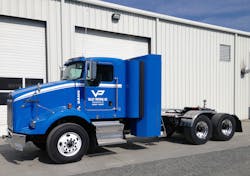Looking to find a way to more closely align its trucking fleet with its image as a recycler, Valley Proteins turned to PacLease for its solution. Working through its local PacLease franchise, MHC Truck Leasing in Charlotte, NC, Valley Proteins put 10 compressed natural gas tractors into its fleet in Gastonia, NC.
“When we decided that we wanted to be an early adopter of natural gas trucks and not sit on the sidelines, we looked at all our options, and PacLease was clearly the leasing company to work with,” says Richard Evans, fleet manager.
Evans says the decision to use natural gas fits in well with Valley Proteins’ identity. The firm is a “rendering company,” meaning it processes and recycles animal by-products to create renewable resources such as feed and oil for biodiesel. A fleet of 455 Class 8 trucks operates out of 21 locations and 12 rendering facilities.
“We take in used restaurant cooking grease—fats, oils and grease from grease traps, plus inedible meat, fat and bone by-products—and in turn create usable products for our customers,” Evans says. “We’re very excited about the future of CNG going forward. It’s also in line with what we do; we recycle and we’re into sustainability. Using natural gas is a natural extension for us, plus it supports our own domestic fuel supply.”
The 10 trucks are just a beginning, Evans notes, as Valley Proteins will continue traveling down the natural gas highway.
MHC Truck Leasing worked with Valley Proteins to ensure the proper specs and training was provided for the Kenworth T800 CNG tractors, which haul dump body trailers fully loaded to 80,000 lbs. with poultry by-products. Each truck is driven about 80,000 mi. per year, making pickups and deliveries within a 100-mi. radius of Gastonia.
AHEAD OF THE PACK
“I talked with all of the large national firms and everything led us back to MHC and PacLease,” Evans says. “It was very evident that MHC and PacLease, through its connection with Paccar and Kenworth, were ahead of the others. They never wavered in what they could do for us. They had a program in place and the experience to move us forward with no risk. It allowed us to put into service CNG trucks without having to worry about ‘what if?’”
The switch to leasing also removed a worry from Valley Proteins, which had previously preferred to own and maintain its trucks for maximum flexibility.
“But natural gas is different, and we wanted a turnkey program that gave us the benefits of fuel savings and sustainability without having to deal with maintenance and any potential downtime. Leasing made sense,” Evans explains.
The T800s feature a 116.5 in. BBC and are spec’d with Cummins Westport ISX12 G engines rated at 400 hp. An Eaton 10-speed transmission is included, a key spec that Evans says presented a problem in locating a leasing provider.
“I’ve dealt with other national leasing companies and they just don’t know equipment like PacLease,” he says. “They don’t have the connection to the factory like PacLease does, and we could spec the trucks like we wanted them. For example, we wanted a 10-speed transmission and another national leasing company we talked with wouldn’t take that spec. They wanted to put us in automatics.
“It speaks volumes when your leasing company will work with you and meet your needs,” he continues. “MHC and PacLease focused in on our business with product and service that we just couldn’t find from anyone else.”
The trucks are equipped with Trilogy 100-gal. diesel equivalent fuel tanks for an operating range that exceeds 400 mi. on a single fueling.
EASY TRANSITION
A thorough orientation program was provided to the company’s drivers, helping ease their transition into natural gas. “That really was a great way to get started,” says Evans. “They explained natural gas and how things would be a little different and how things might stay the same. The performance of the engine is really quite similar to the diesel equivalent; however, there are safety things to go over—and fueling. We even went out to a fueling station and went over procedures. This ensured that our drivers were ready to go from day one.”
MHC Truck Leasing is providing all vehicle maintenance—about every two months or at 25,000-mi. intervals—at its Charlotte facility. If a vehicle will be down for an extended period of time, the lease calls for a replacement vehicle.
The fuel savings are also adding up quickly for Valley Proteins. “Since we’re paying $1.71 for CNG versus $3.38 for diesel in our area, we’re doing exceptionally well in saving money at the pump,” Evans says. “If you project those savings out over a year, it would mean a $22,000 savings in fuel per unit. It’s helping pencil out the advantages of CNG and has the potential to give us a great ROI. What’s more, we’ll be putting about 15% fewer emissions into the air thanks to the cleaner burn of CNG.”
